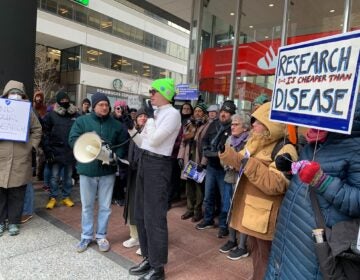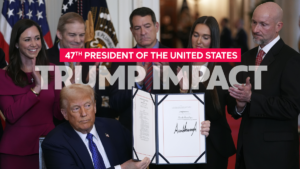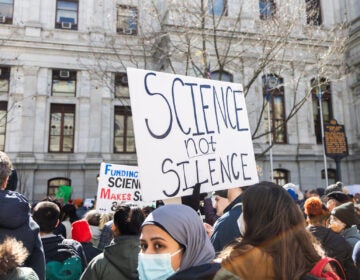Philly scientists, protesters join nationwide push to ‘Stand up for Science’ opposing Trump’s funding cuts
More than 2,000 rallied in Philadelphia as part of a nationwide protest that included almost every state in the U.S.
From Philly and the Pa. suburbs to South Jersey and Delaware, what would you like WHYY News to cover? Let us know!
On Friday morning, more than two thousand people gathered in front of City Hall in Philadelphia to protest the Trump administration‘s cuts to science and research.
This demonstration was part of the “Stand up for Science” protests happening across almost every state in the U.S., and a few locations in Europe and Canada.
The Trump administration wants to drastically reduce how much the National Institutes of Health pays for what are called “indirect costs” related to research grants. The new limit for indirect costs, covering expenses such as building maintenance or electricity, would be 15% of a grant. A federal judge has temporarily blocked this measure. Earlier this week, Nature reported that the NIH has already started canceling research grants that involve transgender populations, gender identity, and environmental justice, among other topics.

Neuroscientist Eartha Mae Guthman from Princeton University recounted that a year ago, the National Institutes of Health gave her funding to continue studying how hormones affect the brain. She explained the research would be useful for gender-affirming care and also have other applications, like birth control and treatments for endometriosis.
Trump has labeled research like this “waste, fraud, and abuse” that is “making mice transgender.”
“I don’t know how or if I’ll get paid next month, and I don’t know if I’ll actually get the funds that Congress has already awarded and apportioned to me to start my own lab,” Guthman told the crowd. “This moment is about more than just me. Under the guise of this anti-trans and anti-DEI moral panic, Republicans are weaponizing the state to attack all science. Their actions prevent us from making life-saving discoveries across all fields.”
Montserrat Anguera, who studies autoimmune diseases at the University of Pennsylvania, said some of the NIH grant funding to her lab has been in limbo for weeks. “These delays mean that my research is slowing down, and I’m afraid that it’s soon going to come to a stop.”
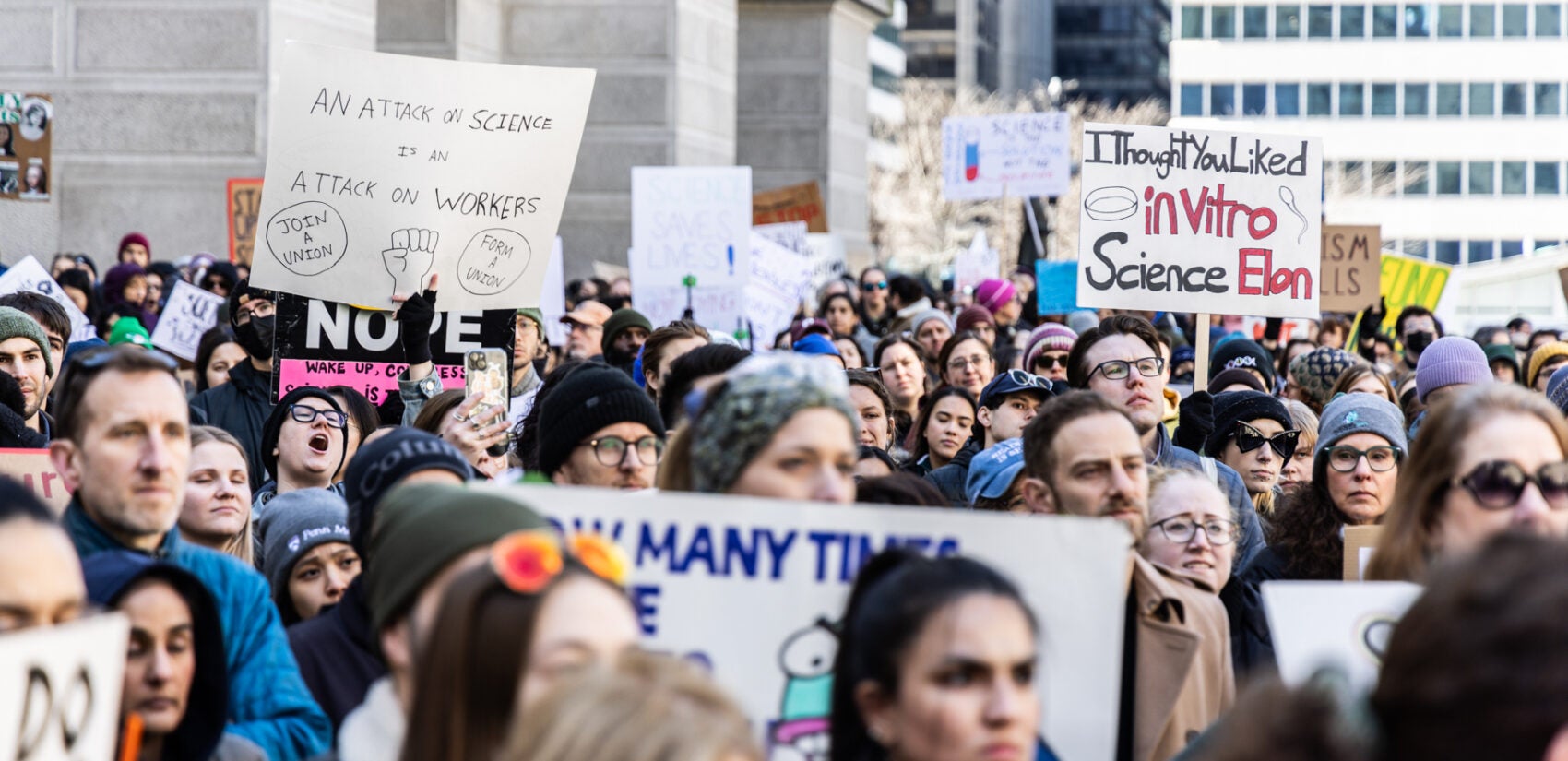
Trump has laid off hundreds of people at the Centers for Disease Control and Prevention and the National Science Foundation. The National Science Foundation is also reviewing already-approved grants to comply with the administration’s executive order to root out research that they label as about “diversity, equity, and inclusion,” leading to concerns among early career scientists.
Science is an important part of the local economy. Higher education institutions and hospitals account for almost 13% of jobs and more than $33 billion of the economy in the Philadelphia region, according to 2022 statistics from the Federal Reserve Bank of Philadelphia. The National Institutes of Health funds more than $2 billion of research in Pennsylvania, supporting more than 20,000 jobs, according to United for Medical Research, a group of research institutions, patient and health advocates, and industry.
Philadelphia City Councilmember Jamie Gauthier, who represents West and Southwest Philadelphia, including University City, called the Trump administration’s cuts a direct threat to her constituents.
“By threatening NIH funding, a president who ran on lowering costs for families threatens to make life more expensive for all of us by shutting off Philadelphia’s economic engine,” she said. “The tens of thousands of jobs at stake are not just for educated scientists, but also Philadelphians from every walk of life: the people who keep the lights on, small businesses and schools around our research institutions — the ripple effects will touch every single corner of our city.”
Computational biologist Lindsay Guare said she would rather be doing her research than speaking at this rally.
“I’m working on like four or five different projects for which I’m going to have to write papers eventually. I would rather be doing science because that’s what I love to do,” Guare said. “For the situation to be so dire that people like scientists are leaving their desk, leaving their lab bench and assembling to demand attention — that says something.”
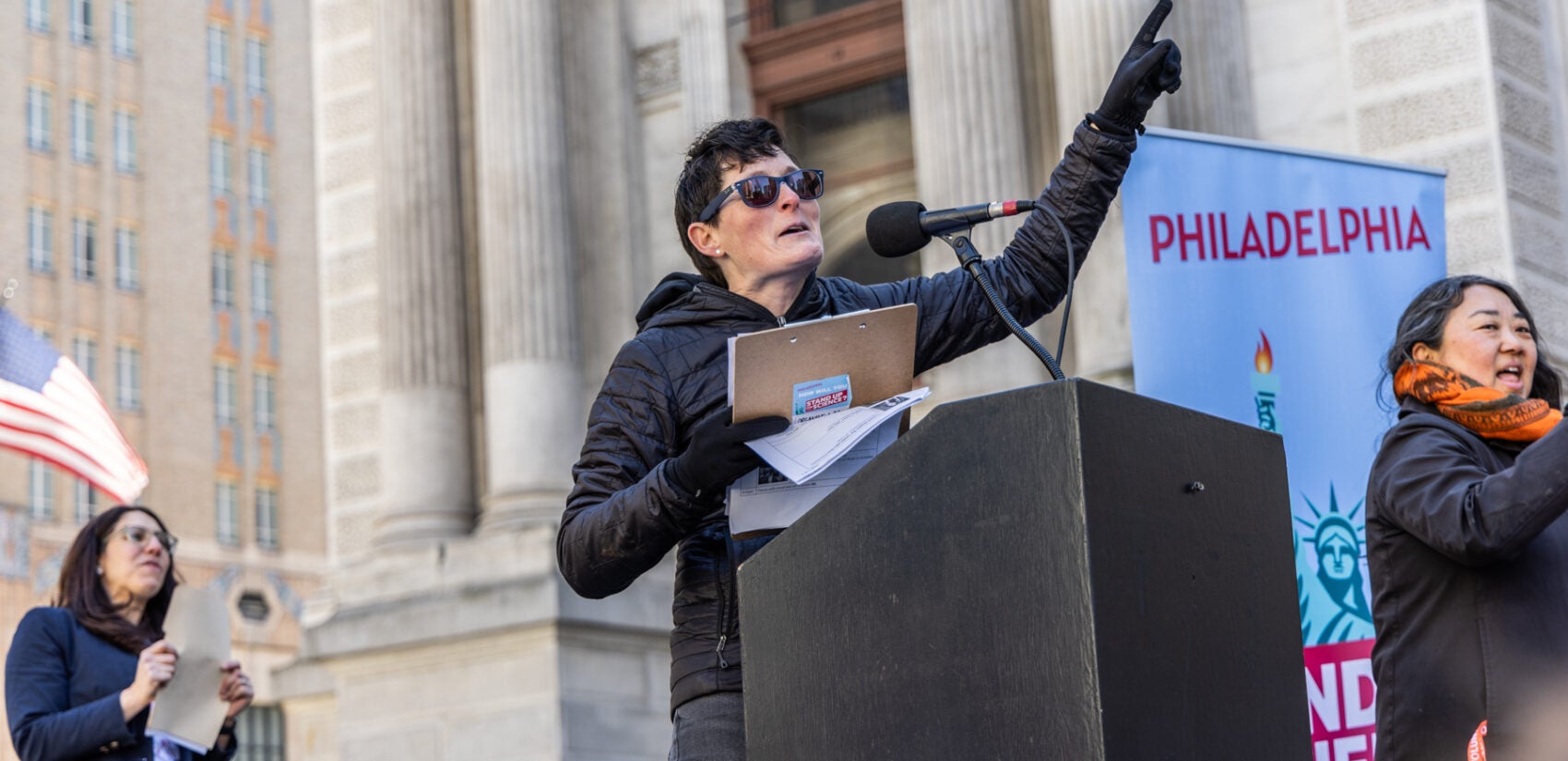
Nurse researcher and innovator Marion Leary, who helped organize the rally, also helped organize the March for Science in 2017 and 2018.
“I cannot believe that we are doing this again in 2025. And it is really a shame that we have to do it,” Leary said. “The Stand Up for Science rally isn’t just for researchers and clinicians and scientists; it’s for everyone who benefits from science … from the clean air we breathe, to the clean water we drink, to the vaccines we receive, to medications we take, to the natural parks that we are able to enjoy.”
The organizers and speakers urged protesters to call their elected officials and demand that the U.S. continue to support health care and science, and even to consider running for elected office themselves.
Kyara Montoya, a biochemistry and molecular biology student at Ursinus College, hopes the rally will bring more attention to what she calls the Trump administration’s censorship of research.
“If anything, this has shown me more than anything how important it is to be a pre-med student, how important it is to stay in medicine, and to show everyone how important of an issue that this is,” Montoya said.

Get daily updates from WHYY News!
WHYY is your source for fact-based, in-depth journalism and information. As a nonprofit organization, we rely on financial support from readers like you. Please give today.



